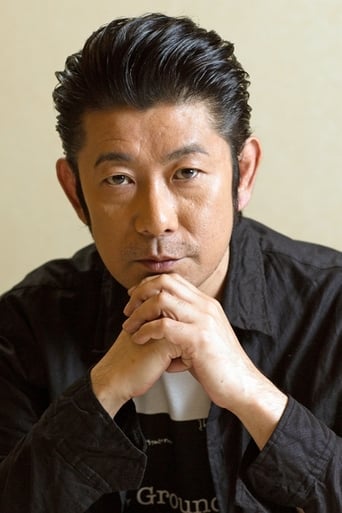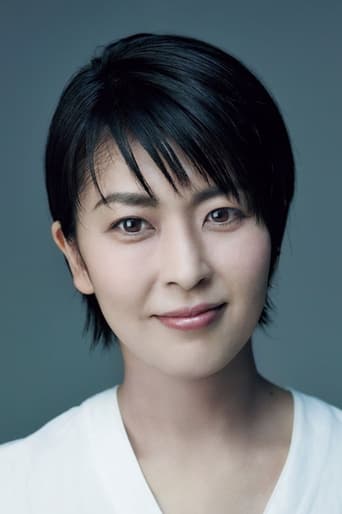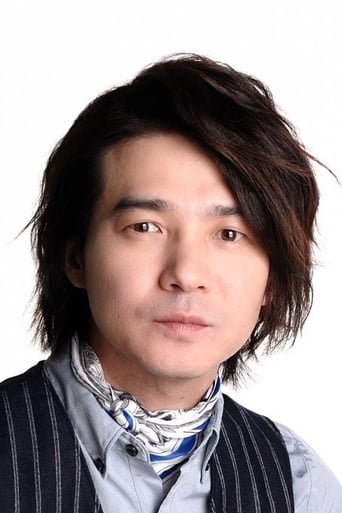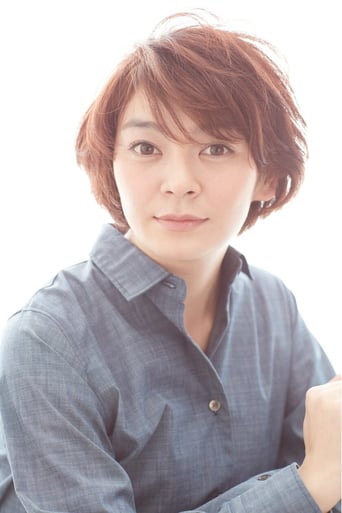Steineded
How sad is this?
Derrick Gibbons
An old-fashioned movie made with new-fashioned finesse.
Gary
The movie's not perfect, but it sticks the landing of its message. It was engaging - thrilling at times - and I personally thought it was a great time.
petsteph1
Having recently worked through a dozen or so samurai films, including Kurosawa's generally brilliant offerings, my taste had become fairly attuned to the genre and although several were very good the style was beginning to wear thin. Until Hidden Blade. This is an exceptional film; original in story, characters and direction. The plot is quite simple: a samurai whose father's disgrace has reduced the family in status, lives with a maid and a servant. He is in love with the maid, and she with him, but the social conventions and their own decency prevent this from becoming anything more than a tender friendship. The samurai's sword school companion gets himself into trouble and finally their sword-brother relationship leads the plot to a climax. There are several fights, a background of western military training being given to the samurai in this area, but above all that is the compassion and decency of the samurai and his maid. There is not a wasted moment in the direction; the scenery is beautiful; the acting is very engaging; the story seems to move at a gentle pace but it's impossible to take your eyes off the screen - one of those truly well- made movies where the technical excellence is so understated that you know only that you're being swept along with the story. Highly, highly recommended.
Terrell-4
With Yoji Yamada's The Hidden Blade, set in the early 1860s, the age of the samurai was passing; the age of moviedom's bastardization of the samurai was sometime in the future. The Hidden Blade is one of three movies Yamada made based on stories by Shuhei Fujisawa. They all deal with the end of the rigid social caste system of the Tokugawa era, the cracks and corruption in the samurai code, and the effects of this on some of those in the samurai class whom we come to know. These movies aren't flash and slash epics or just cheap entertainment. The films in many ways are quiet, even when there is violence. Sadness and difficult choices are pervasive. The films, in other words, are wonderful. For the record, the three films are The Twilight Samurai (Tasogare Seibei) (2002), The Hidden Blade (Kakushi Ken Oni no Tsume) (2004) and Love and Honor (Bushi no Ichibun) (2006). The Hidden Blade is the story of Munezo Katagiri (Masatoshi Nagase), a poor samurai who does his duty to his clan in a small village in the north of Japan. His father was forced to commit hari kiri unjustly, but the father submitted because obeying the lord was the core of his life. A friend of Katagiri's, Yaichiro Hazama, who earlier went to Edo, has been implicated in a treason plot against the shogun. Hazama is sent back to the village for imprisonment. At the same time, Katagiri's sister has married a good friend, his mother has died, and he has found a merchant husband for the family's maid, a young woman named Kie (Takako Matsu), the daughter of a farmer who had been trained in many skills by Katagiri's mother. We can tell there is affection and respect between the two, but the idea of marriage is never recognized because of the rigid separation of the four castes. Katagiri rescues Kie from the cruel marriage but cannot keep her with him. He returns her to her farmer father. When Hazama escapes, Katagiri is ordered to go to Hazama, one of his best friends, and kill him in a duel. Hazama is a fine swordsman. Katagiri is almost as good. Katagiri learns his clan's senior adviser is venal and dishonest. Katagiri must obey, but afterwards, in disgust, takes his own actions. At last he secures his future, whatever that might be...but it won't be as a samurai. If this all sounds mundane, it is and it isn't. In slightly more than two hours, Yamada lets us see these people's lives, everything from the rigid strictures of behavior and outward respect to how a servant washes clothes, from how to cut firewood to what a prisoner basket is, from what a poor samurai's house is like or a merchant's fabric shop to what it takes to train barely educated bumpkin samurai in gunnery and marching. It's all fascinating, more so because these are all more-or-less ordinary people in a system of rigid class inequities, where people have few if any options. Yet if Munezo Katagiri's story is told deliberately, it is never slow. Yes, we have a great (and not flashy) sword fight toward the end of the movie, and a fast and satisfying act of deadly justice to witness. The heart, however, of the movie's tension comes from Karagiri's struggle to obey the old rules while realizing how unjust and corrupt they can be. Masatoshi Nagase gives a marvelous performance...thoughtful, serious, underplayed. The movie ends with a mutual expression of love and commitment between Katagiri and Kie that is delightful and touching. One of the fascinating aspects of Japan is how rigidly enforced and how accepted the social order was, and then how quickly and, in some cases, how ruthlessly it began to crumble. The samurai class, above the other three classes, was made up of warriors without wars. They sank into near irrelevance except for their privileges and social status. The merchant class, lowest of the classes, rose to power because they produced nothing of value, in the Buddhist sense, just money. Money proved more powerful than swords. By the end of The Hidden Blade it's clear that disciplined peasants bearing expensive firearms can take care of any charging, sword-bearing samurai they might encounter.
Dustin Luke Nelson
This film is easily one of the best samurai films to emerge since Kurosawa's 'Ran' in 85. The thin color palette, graceful use of mise-en-scene, dense landscapes (the winter ones are especial beautiful) are resonate in the tone of 60-70s samurai masters like Okamoto. But the story, though traditional, resonates with more modern concerns. It's more a reflection on the past to try to understand the present. The beginning presents the main character as a lower class samurai struggling to adapt to the changing landscapes of Japan. Trying to read English and Dutch and failing to learn how to use firearms and other Western military devices and tactics. It's an intense samurai film in the style of Japanese classics, but dense with application to the modern world struggles. An alternative view of the samurai film that's worth a couple of hours.
noralee
"The Hidden Blade (Kakushi-ken: oni no tsume)" is filmed in a deceptively old-fashioned and leisurely style to make pointed observations of Japanese society, much as "Far From Heaven" did for the U.S. Director/co-writer Yôji Yamada again adapts Shuuhei Fujisawa stories as he did so beautifully in "Twilight Samurai (Tasogare Seibei)". Taking place just a few years before Hollywood's "The Last Samurai", this feels like a rebuke and response to that very Westernized interpretation of some of the same issues of how changes in military technology impacted feudalism and imperialism, as well as visually referencing many classic Japanese samurai films, but from a more individualized point of view then Kurosawa, Kobayashi or InagakiThe first half of the film establishes the complicated domestic life and frustrating work of the struggling samurai (a solid and sympathetic Masatoshi Nagase, channeling Toshirô Mifune). The broadly comic scenes of fumbled rifles and cannon training recall similarities with the "Sharpe" TV series of the just a bit earlier Napoleonic wars. Particularly lovely are household hearth scenes of warmth between generations and between master and servants.But this is not the idyllic village where Tom Cruise sojourned, as darker abuse is revealed and the samurai flaunts rigid social protocols to do right by those he cares for, especially the young maid "Kie" (Takako Matsu channeling the three little maids from "The Mikado" a bit too much). He is slow to reveal emotions or take action (the romance goes beyond Jane Austen in its cross-caste sidling and very slow resolution), suppressing vivid childhood memories we see very briefly in flashbacks in contrast to his voluble friend who rebels, including against traditional suicide.The emphasis throughout the film is on generational conflict, as elders who are to be venerated are constantly shown to be fools or much worse -- old uncles complain about younger people (whose names they can't keep straight) using the new Western weapons, but place a higher priority on eating; a mother-in-law viciously mistreats her daughter-in-law to increase profits; a corrupt senior retainer (the feudal titles do not seem well-translated in the subtitles) lies and manipulates while enjoying geishas and complaining about his prostate problems. But a teacher derided as a "crazy old man" who can still best the young swordsman passes on more useful stealth techniques than the martinet drill sergeant who has inherited the honorific "sensei" with his British guns.While as usual in such films, I simply cannot follow the Byzantine shogun politics even with a superfluous narration, as I've never studied Japanese political history, the second half ironically builds on the iconography of the genre with unusual sights and sounds. Macho conflicts are filmed voyeuristically, with sidling camera angles that indicate a passing from mano a mano duels to the anonymity of modern weapons, and thus justifying the use of the titular vengeance.The exquisite cinematography and sound design create a special environment. With a look of faded epic cinematography like the passing of an age, we see snow falling on parasols, cherry blossoms on the path and rain fall on unrequited love. We hear them too, as the breezes, wind, crickets, birds, rain and the household sounds of tools and crackling fire punctuate long silences and dominate more than the conventionally soaring score that is used judiciously. But a prison and eventual bloody fights in a heavily symbolic fog are not minimalized.The production design is much more elaborate in showing us traditional architecture than most such Japanese films. I'm sure some of the social and historical commentary just goes by a Western audience unfamiliar with particulars, but the themes of individuals caught up in social proscriptions who rebel and seek love, respect, peace and, most of all, control over their lives is universal and very involving.





